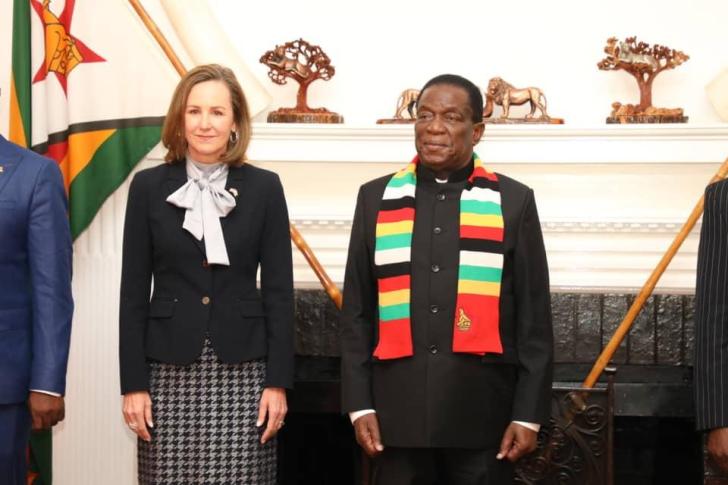News / Local
Zimbabweans slam US Embassy for downplaying impact of sanctions
21 Oct 2024 at 13:16hrs |
0 Views

Zimbabweans and international supporters have expressed outrage over the US Embassy's recent claims regarding the effects of sanctions on the country, demanding that the "illegal coercive measures" be lifted entirely. The controversy erupted when the US Embassy stated on its website that only 11 individuals out of Zimbabwe's 16 million population are under sanctions, implying that the measures do not impact ordinary citizens.
Critics swiftly countered this assertion, pointing out that the sanctioned individuals, including President Emmerson Mnangagwa, occupy strategic positions that influence Zimbabwe's entire economy, indirectly affecting millions of people.
On social media platform X (formerly Twitter), users voiced their displeasure. Commenting on the embassy's post, @KudzaiMutisi wrote, "You have no right to impose sanctions on people who are not your citizens… more so without any trial. Where were they tried and convicted?"
Another user, @Douglas Dizoni, posted a picture of fire engines destined for Zimbabwe but confiscated by Lithuania last year while en route from Belarus, which is under European Union sanctions. "You should stop playing with our minds. You know very well you have sabotaged the Zimbabwean economy, hoping it leads to an uprise. It will not work," Dizoni wrote.
Public relations specialist @Vlada Galan highlighted the broader economic impact, noting that Zimbabwe has lost over US$42 billion in revenue over the past 19 years due to sanctions. This includes lost bilateral donor support estimated at US$4.5 billion annually since 2001, US$12 billion in loans from international financial institutions, commercial loans of US$18 billion, and a GDP reduction of US$21 billion.
Others, like @Sinclair Skinner, called for an end to what they described as economic espionage, accusing the US government of destabilizing Zimbabwe for regime change. "The US Govt has been engaged in unilateral crimes against humanity in destabilising Zimbabwe's economy for regime change. Lift all sanctions now!" Skinner posted.
Meanwhile, @Honorebel One argued that sanctions are part of the US strategy to control resources and punish nations asserting their sovereignty, calling for greater accountability from the international community: "The US uses sanctions to control resources, strategic locations, and punish nations asserting sovereignty. But who holds the US accountable?"
The debate over sanctions in Zimbabwe remains a contentious issue, with the US insisting that its measures target specific individuals and entities involved in corruption and human rights abuses, while critics argue that the sanctions have widespread repercussions, crippling the country's economic recovery. The growing chorus of voices demanding their removal highlights the deep frustrations felt by many Zimbabweans and their supporters globally.
Critics swiftly countered this assertion, pointing out that the sanctioned individuals, including President Emmerson Mnangagwa, occupy strategic positions that influence Zimbabwe's entire economy, indirectly affecting millions of people.
On social media platform X (formerly Twitter), users voiced their displeasure. Commenting on the embassy's post, @KudzaiMutisi wrote, "You have no right to impose sanctions on people who are not your citizens… more so without any trial. Where were they tried and convicted?"
Another user, @Douglas Dizoni, posted a picture of fire engines destined for Zimbabwe but confiscated by Lithuania last year while en route from Belarus, which is under European Union sanctions. "You should stop playing with our minds. You know very well you have sabotaged the Zimbabwean economy, hoping it leads to an uprise. It will not work," Dizoni wrote.
Public relations specialist @Vlada Galan highlighted the broader economic impact, noting that Zimbabwe has lost over US$42 billion in revenue over the past 19 years due to sanctions. This includes lost bilateral donor support estimated at US$4.5 billion annually since 2001, US$12 billion in loans from international financial institutions, commercial loans of US$18 billion, and a GDP reduction of US$21 billion.
Others, like @Sinclair Skinner, called for an end to what they described as economic espionage, accusing the US government of destabilizing Zimbabwe for regime change. "The US Govt has been engaged in unilateral crimes against humanity in destabilising Zimbabwe's economy for regime change. Lift all sanctions now!" Skinner posted.
Meanwhile, @Honorebel One argued that sanctions are part of the US strategy to control resources and punish nations asserting their sovereignty, calling for greater accountability from the international community: "The US uses sanctions to control resources, strategic locations, and punish nations asserting sovereignty. But who holds the US accountable?"
The debate over sanctions in Zimbabwe remains a contentious issue, with the US insisting that its measures target specific individuals and entities involved in corruption and human rights abuses, while critics argue that the sanctions have widespread repercussions, crippling the country's economic recovery. The growing chorus of voices demanding their removal highlights the deep frustrations felt by many Zimbabweans and their supporters globally.
Source - The Herald
Join the discussion
Loading comments…






































